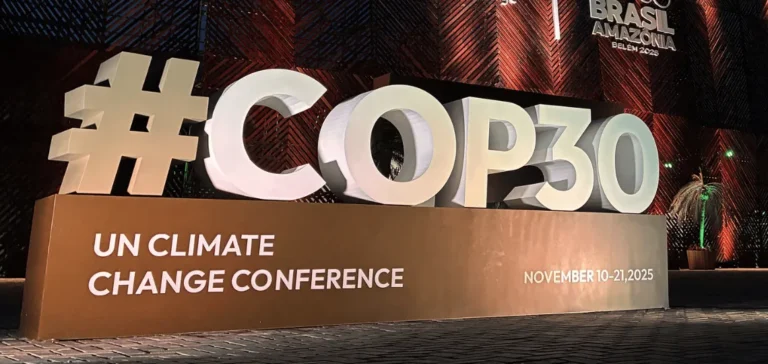Despite the withdrawal of the US federal government from the Paris Agreement and UN climate finance mechanisms, the participation of major American companies at COP30 has risen significantly. Nearly sixty Fortune 100 company representatives are attending the summit in Belém, up from fifty at the previous edition. This increase reflects a strategic response to extra-American regulatory pressures, particularly from Europe and Asia, which are seen as long-term commercial risks.
Strategic decoupling between Washington and large corporations
The federal government exited the Paris Agreement in January 2025 and withdrew from several multilateral programmes, such as the Loss and Damage Fund and the Just Energy Transition Partnerships. This policy stance has created a regulatory vacuum that companies are now addressing by participating directly in international climate negotiations.
The goal of the attending companies is not driven by corporate social responsibility motives but rather by integrated risk management. Obligations linked to the Carbon Border Adjustment Mechanism (CBAM), the European Corporate Sustainability Reporting Directive (CSRD), and rising climate-related litigation are pushing companies to align with emerging standards.
Sectoral impacts across technology, energy and agri-food
Microsoft and Google aim to secure decarbonised power supply for their data centres while also developing tools for climate risk modelling. The federal pullback has created a commercial opening for their climate intelligence platforms, which are increasingly adopted by private sector players.
Among oil majors, ExxonMobil and Occidental are investing in carbon capture and storage technologies to address regulatory pressure while maintaining fossil fuel output. These strategies are designed to protect carbon-exposed assets from future carbon taxation or climate litigation.
Finance adapting to extraterritorial rules
Major banks such as Citigroup are attending COP30 to anticipate regulatory trends from Europe and Asia, including climate stress testing frameworks and green taxonomies. Their European subsidiaries will be subject to CSRD requirements, regardless of the Securities and Exchange Commission (SEC) climate rules, which have been partially suspended.
The financial sector is working to harmonise its disclosures and incorporate the most demanding transition scenarios to meet the expectations of global institutional investors and non-US regulators.
Towards multipolar climate governance
The presence of American non-state actors—companies, governors, and universities—is coordinated by coalitions such as America Is All In and the We Mean Business Coalition. These groups are filling the leadership void left by federal institutions and enabling alignment with the strictest international regulations.
The European Union, Japan and South Korea are enforcing increasingly detailed rules on product carbon content and non-financial reporting, effectively transforming COP30 into a global standards alignment forum rather than a purely diplomatic round.
Impacts on trade and climate geopolitics
The CBAM acts as a de facto carbon price on high-emission US imports, while CSRD imposes detailed disclosure obligations on non-EU firms above certain revenue thresholds. These frameworks influence investment decisions, supply chain locations and transfer pricing strategies.
Simultaneously, the US retreat has created a vacuum in climate science governance, filled by private data firms such as Planet Labs and GHGSat. These actors are seeking recognition of their methodologies within international mechanisms, particularly carbon markets.
Companies seek regulatory certainty
The shared strategy among US companies at COP30 is to align with the most stringent international standards to avoid regulatory fragmentation and reduce litigation risk. This approach reflects an expectation that global climate frameworks will persist beyond current US political cycles.
The strong corporate presence in Belém highlights how the energy transition is increasingly framed as a global compliance issue, where market access depends on proactive alignment with emerging climate rules.






















